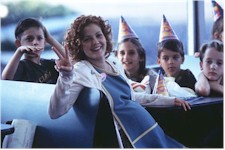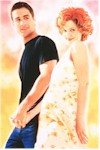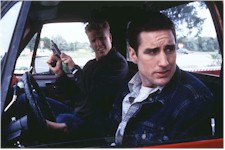|
| |
Home Fries
Review by Gregory Avery
Posted 25 November 1998
 |
|
Directed by Dean Parisot. Starring
Drew Barrymore, Luke Wilson, Jake Busey,
Shelley Duvall and Catharine O'Hara.
Written by Vince Gilligan. |
In Home Fries, Drew Barrymore plays Sally, a
young woman who works a thankless job at the drive-up window of a burger joint in a small
Texas town, and who is also eight months pregnant with a child by a married man to whom
she has just given the boot. (He was not only lying to her, but he was also lying to his
wife, which, in her mind, just isn't right.) Trudging back and forth to work on-foot
(Barrymore gets the laden, duck-like walk which many pregnant women must suffer with down
just right) from home, where she lives with her mother (Shelley Duvall), Sally does her
work with as much good humor as she can muster, working the drive-up window specifically
so that the customers who are ordering food won't see her enormous form, and the other
workers and the manager respond to her with surprising protectiveness.
 The married
man's two grown stepsons, Angus (Jake Busey) and Dorian (Luke Wilson), who fly Cobra
helicopters at the nearby Army base, pull a prank on him designed to merely scare the crap
out of him. But the prank goes awry, and the two sons, concerned with covering their
traces, think that Sally may know something about what they've done. With military
efficiency, they decide to infiltrate the burger restaurant to find out how much she
knows. The chore falls to Dorian to, grudgingly, get a job there, and ingratiate himself
to Sally. They both end up falling, gently and sweetly, in love with each other, without
Sally knowing what Dorian's relation is to the man who fathered her child. Meanwhile,
Dorian, too, becomes increasingly protective of Sally. The married
man's two grown stepsons, Angus (Jake Busey) and Dorian (Luke Wilson), who fly Cobra
helicopters at the nearby Army base, pull a prank on him designed to merely scare the crap
out of him. But the prank goes awry, and the two sons, concerned with covering their
traces, think that Sally may know something about what they've done. With military
efficiency, they decide to infiltrate the burger restaurant to find out how much she
knows. The chore falls to Dorian to, grudgingly, get a job there, and ingratiate himself
to Sally. They both end up falling, gently and sweetly, in love with each other, without
Sally knowing what Dorian's relation is to the man who fathered her child. Meanwhile,
Dorian, too, becomes increasingly protective of Sally.
If the opening scenes -- sleekly photographed close-ups of objects at night, a
helicopter's searchlight swimming over open ground -- look like "The X Files",
that's because the screenplay was written by Vince Gilligan, a writer for the show. Dean
Parisot, who has previously worked on the TV show "Northern Exposure", directed.
They bring a considered sense of observation and progression to the material -- the scenes
at the burger joint look like they were created by someone who has at one point paid their
dues working at a burger joint -- along with an amount of playfulness, steering the
material in such unusual directions as if to see what'll happen if they do, and to keep
the audience's expectations slightly akimbo. The picture is not a complete success, but
when it works, it achieves the rare feat of becoming a comedy of absurdity, with a daft
kind of logic all its own.
Drew Barrymore has lost some of the "babyfat" look to her face but still has
a beguiling appeal -- she looks like the girl who broke all the boys' hearts in class, and
they all liked it. She doesn't entirely seem to fit in this particular role -- it's hard
to believe that someone who looks like her would be slaving away at a menial job, and
Barrymore's attempts to give Sally a rolling, lackadaisical speaking cadence sound
affected -- but she works hard, and she does some very nice things in the film. When she
kisses Wilson's Dorian for the first time, she holds-in her lower lip after they part, as
if savoring the experience for just a few moments longer.
 Luke Wilson has
studious, vermicular features and eyebrows that seem to have been pinched together a bit.
Both his and Jake Busey's characters come across as boys who were brought up to be
respectable -- as well as respectful -- young men, to say "please" and
"thank you", and to justify the fact that they were "brought up
right". At one point in the film, Dorian overhears a customer haranguing Sally at the
drive-up window, and he goes outside and gets into the man's car to tell him, quietly but
assertively, that Sally doesn't deserve that type of treatment. (It somehow makes sense
that the customer should have Los Del Rios' "Macarena" playing in his car.) Yet
both the brothers have a streak of feeling trying to get out of them. Wilson brings an
easy charm and earnestness to his role, but he also performs with great precision. When
Dorian agrees to help Sally at her Lamaze class, he handles her as they go through the
various, somewhat cumbersome, exercises with delicacy and a certain chivalrousness, all
the while trying not to let his embarrassment, at being in such close proximity to a
pretty and fulsome woman, show; you feel he doesn't want to make her embarrassed by seeing
that he's embarrassed. Which is what makes the eventual romance that occurs between them
quite affecting. Luke Wilson has
studious, vermicular features and eyebrows that seem to have been pinched together a bit.
Both his and Jake Busey's characters come across as boys who were brought up to be
respectable -- as well as respectful -- young men, to say "please" and
"thank you", and to justify the fact that they were "brought up
right". At one point in the film, Dorian overhears a customer haranguing Sally at the
drive-up window, and he goes outside and gets into the man's car to tell him, quietly but
assertively, that Sally doesn't deserve that type of treatment. (It somehow makes sense
that the customer should have Los Del Rios' "Macarena" playing in his car.) Yet
both the brothers have a streak of feeling trying to get out of them. Wilson brings an
easy charm and earnestness to his role, but he also performs with great precision. When
Dorian agrees to help Sally at her Lamaze class, he handles her as they go through the
various, somewhat cumbersome, exercises with delicacy and a certain chivalrousness, all
the while trying not to let his embarrassment, at being in such close proximity to a
pretty and fulsome woman, show; you feel he doesn't want to make her embarrassed by seeing
that he's embarrassed. Which is what makes the eventual romance that occurs between them
quite affecting.
The prank that gets the whole magilla started in the first place may have been partly
Angus and Dorian's idea, but not entirely. It turns out that these two have gone, and will
end up going to, great lengths just to make their mother happy. The scornful wife and
mother is played by Catharine O'Hara, whose characterization skillfully alternates between
moments of emotional duress -- or, rather, whatever type of duress would most suit her for
the moment -- and sudden, sharp little instances of revelation that clue us in as to
what's actually going on inside her head -- such as how she may have wanted to get rid of
her philandering husband more than we, possibly, even want to know.
 O'Hara still
has the amazing ability to pick up on and communicate to the audience the particular slant
that will make us fully comprehend whatever character she's playing. Unfortunately, she
only works as a performer when she darn well feels like it, making her appearances almost
as few and far between as Paul Scofield's. Things that O'Hara has done over the last 15
years, however, keep coming back to mind long after miles and miles of film by other
people has been forgotten: an "SCTV" sketch where she played Katharine Hepburn,
opposite three other performers playing Richard Burton, Peter O'Toole and Richard Harris
("Oh, I just love the sound of your voices, together..."), in a movie entitled The
Man Who Would Be Pope and King; a pernicious woman who deliberately makes Griffin
Dunne forget a phone number he's trying to dial in After Hours; and a wonderful
appearance -- which is all of one scene -- as a resentful, boozed-up woman who pours out
her heart, and then some, to a friend in Ron Howard's The Paper. Home Fries
-- at least, the way it's turned out -- doesn't quite seem to know what to do with her
character at the end, but the closing sequences in general have a trammeled-up quality to
them, as if the filmmakers were uncertain what to do with the movie as a whole in the end.
It does have several things worth having a look at, but any excuse to see Catharine
O'Hara, one of the most gifted comic and satiric performers of the last 20 years, is
reason enough. O'Hara still
has the amazing ability to pick up on and communicate to the audience the particular slant
that will make us fully comprehend whatever character she's playing. Unfortunately, she
only works as a performer when she darn well feels like it, making her appearances almost
as few and far between as Paul Scofield's. Things that O'Hara has done over the last 15
years, however, keep coming back to mind long after miles and miles of film by other
people has been forgotten: an "SCTV" sketch where she played Katharine Hepburn,
opposite three other performers playing Richard Burton, Peter O'Toole and Richard Harris
("Oh, I just love the sound of your voices, together..."), in a movie entitled The
Man Who Would Be Pope and King; a pernicious woman who deliberately makes Griffin
Dunne forget a phone number he's trying to dial in After Hours; and a wonderful
appearance -- which is all of one scene -- as a resentful, boozed-up woman who pours out
her heart, and then some, to a friend in Ron Howard's The Paper. Home Fries
-- at least, the way it's turned out -- doesn't quite seem to know what to do with her
character at the end, but the closing sequences in general have a trammeled-up quality to
them, as if the filmmakers were uncertain what to do with the movie as a whole in the end.
It does have several things worth having a look at, but any excuse to see Catharine
O'Hara, one of the most gifted comic and satiric performers of the last 20 years, is
reason enough.
Be sure to read the coverage of the film at the Toronto
International Film Festival ...
Contents | Features
| Reviews | News | Archives | Store
Copyright © 1999 by Nitrate Productions, Inc. All Rights Reserved.
| |
|